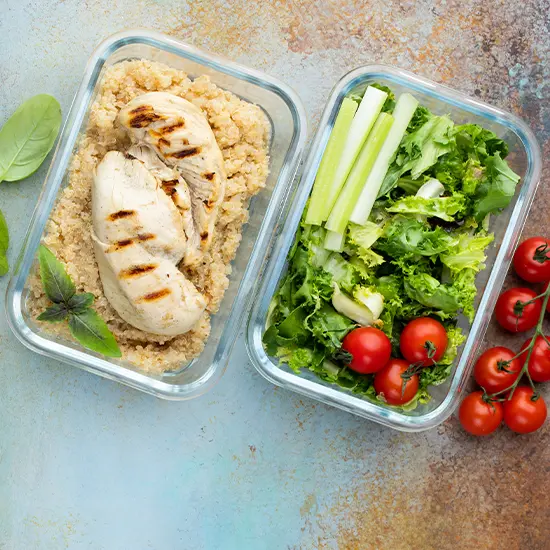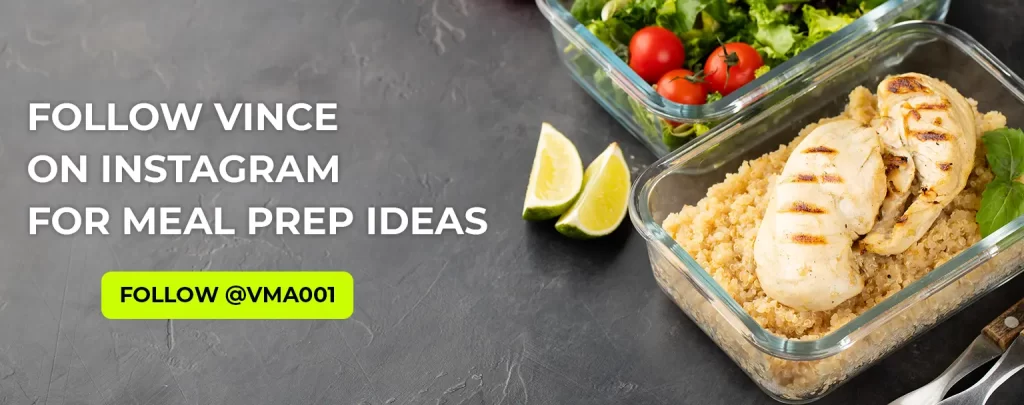Table of Contents (_workinprogress_)
One of the biggest challenges of maintaining a healthy lifestyle for many of us is eating well consistently.
Between busy work schedules, social commitments, and family responsibilities, it’s easy to reach for convenience foods that aren’t always the healthiest choice. That’s where meal prepping comes in. By setting aside a little time to plan and prepare your meals for the week, you can ensure you have nutritious, balanced options ready to go, no matter how busy life gets.
Whether you’re new to meal prep or looking to refine your process, this guide will help you plan your nutrition efficiently for the week ahead.
Why Meal Prep?
Meal prepping has countless benefits beyond simply saving time during the week. Here’s why meal prep can be a game-changer for your health and fitness goals:
- Portion Control: Meal prepping allows you to portion out your meals in advance, helping you avoid overeating and ensuring you stick to your nutritional goals.
- Healthier Choices: Having pre-prepared meals on hand makes it less likely you’ll resort to unhealthy takeout or processed foods when you’re short on time.
- Saves Time and Stress: By prepping your meals in one go, you eliminate the daily stress of deciding what to eat. It also means fewer last-minute grocery trips.
- Budget-Friendly: Planning your meals for the week can help you avoid impulse buys and cut down on food waste, saving money in the process.
Plan Your Meals Around Your Goals
Before you start meal prepping, it’s important to define your goals. Are you trying to lose weight, gain muscle, or simply eat more balanced meals? Your nutrition plan should reflect these objectives. If weight loss is your goal, you’ll need to focus on portion sizes and calorie control. If you’re trying to build muscle, you’ll want to prioritize protein-rich meals. No matter your goal, a good mix of lean proteins, whole grains, healthy fats, and plenty of vegetables should form the foundation of your meal prep.
Create a Simple, Balanced Menu
Meal prep doesn’t have to be fancy or complicated. Start by creating a menu for the week that includes breakfast, lunch, dinner, and snacks. Here are some tips for creating a balanced meal plan:
- Lean Proteins: Chicken, turkey, fish, eggs, tofu, and legumes are great protein sources that can be used in a variety of ways throughout the week.
- Complex Carbs: Choose whole grains like quinoa, brown rice, oats, or sweet potatoes to keep you feeling fuller for longer.
- Healthy Fats: Include healthy fats such as avocados, nuts, seeds, and olive oil for brain and heart health.
- Vegetables: Load up on a variety of colorful vegetables to get the nutrients your body needs. Roasting or steaming large batches of veggies makes it easy to add them to any meal.
- Snacks: Keep healthy snacks like fruit, nuts, Greek yogurt, or hummus with veggies on hand for when hunger strikes between meals.
Shop Smart and Efficiently
Once your menu is set, it’s time to create a detailed shopping list. Organize your list by category (produce, protein, grains, etc.) to make your grocery shopping trip as quick and efficient as possible. Sticking to your list will also help you avoid the temptation of buying unnecessary, less healthy options.
Set Aside Time to Prep
Meal prepping doesn’t have to take up your entire weekend, but setting aside 1–2 hours on a Sunday (or whatever day works best for you) can set you up for success all week. Here’s a breakdown of how to efficiently use your time:
- Cook in Batches: Prepare large batches of proteins, grains, and veggies all at once. You can grill or bake chicken, cook a big pot of quinoa or rice, and roast a sheet pan of mixed vegetables in the oven simultaneously.
- Use Multi-Function Appliances: Slow cookers, Instant Pots, or air fryers can help you cook multiple meals with minimal effort and time.
- Pre-portion Your Meals: Divide your meals into individual containers. This makes it easy to grab a pre-portioned meal on your way out the door or when you get home from work.
- Label and Store: Label your meals with the day you plan to eat them. Store them in the fridge for meals within the next few days, and freeze anything you won’t eat right away.
Keep It Fresh and Tasty
One of the biggest concerns with meal prep is getting bored of eating the same food every day. To avoid this, mix up flavors and seasonings. You can prepare a base like chicken or tofu and then use different sauces, spices, or dressings to change up the flavor throughout the week. This keeps your meals exciting without adding too much extra time to your prep routine. [1]
Stay Flexible
Meal prep is meant to make your life easier, not more stressful. If something comes up and you can’t stick to your meal plan for a day or two, don’t worry. Use meal prep as a tool to help you stay consistent, but allow room for flexibility when life gets busy. The key is to stay on track most of the time.
Conclusion: Effective Way To Maintain a Healthy Diet
Meal prepping is one of the most effective ways to stay on top of your nutrition and maintain a healthy lifestyle, especially when you’re short on time. By planning your meals, shopping smart, and prepping in advance, you can ensure that you’re fueling your body with nutritious, balanced meals all week long. Start simple, stay consistent, and watch how meal prep can transform your approach to healthy eating.
Read Next: Balancing Fitness & Life
External Links
[1] Harvard SPH – The Nutrition Source – click here.
Everyday Health – 8 Benefits of Meal Prepping – click here.

Vince Alessia
Fitness & Nutrition Expert
As his passion for health and wellness grew, Vince went on to pursue a bachelors degree in Nutrition at the University of Illinois at Chicago as well as becoming a Certified Personal Trainer. Believing in continuing education, he did not stop there, he also received his certification from the National Academy of Sports Medicine.




